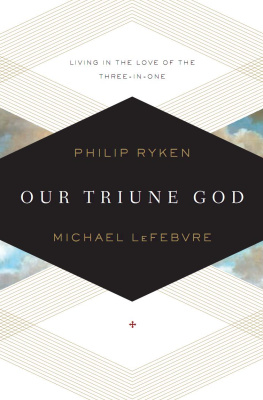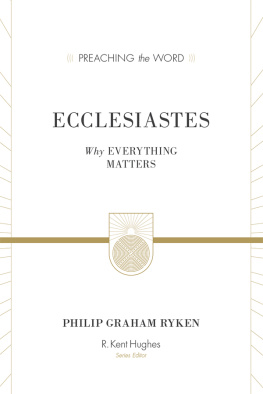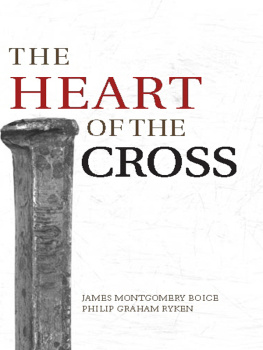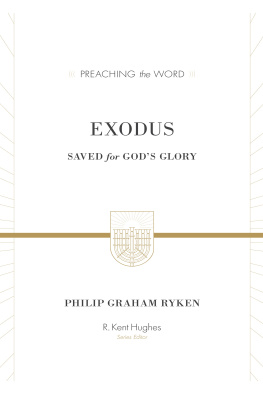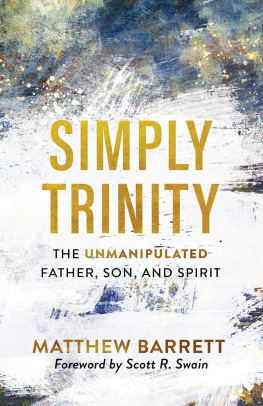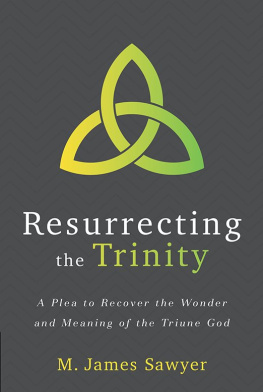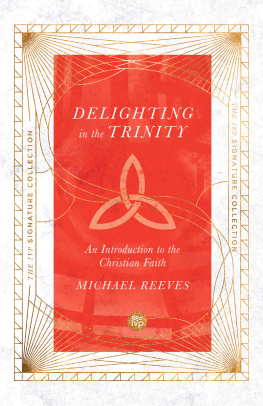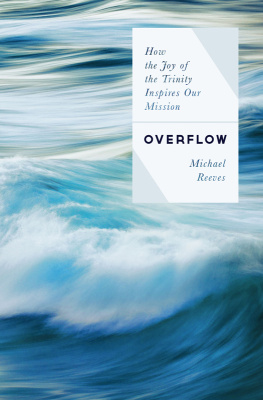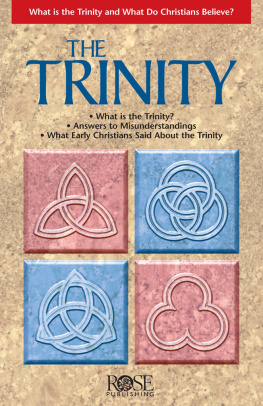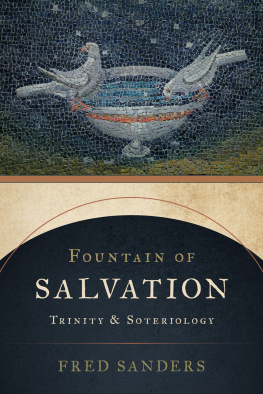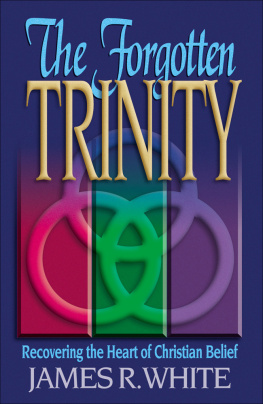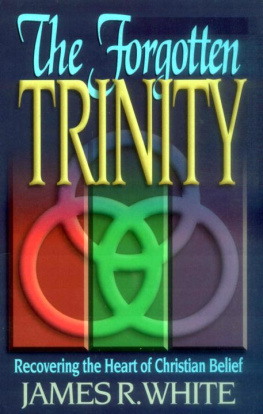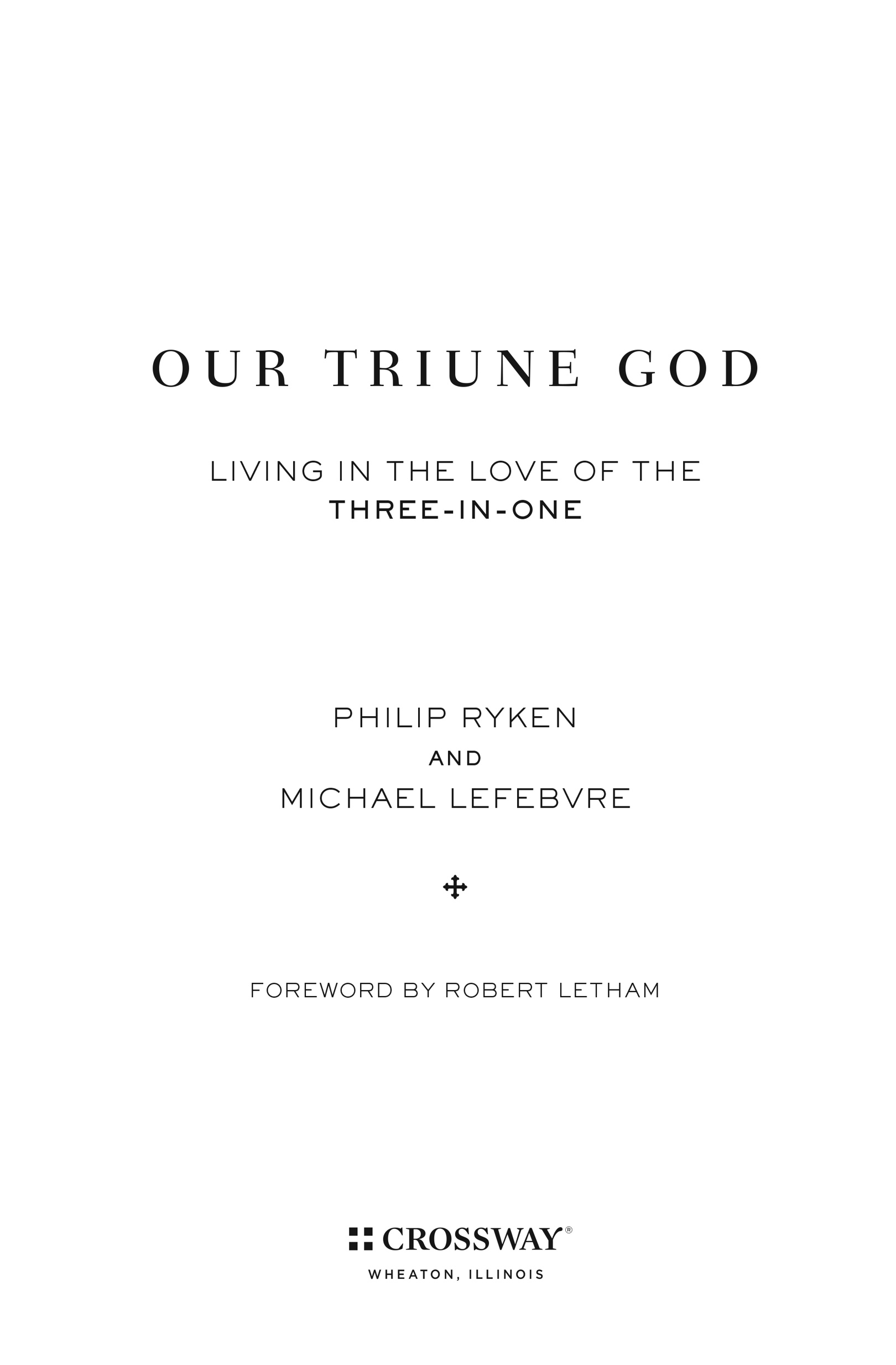Philip Ryken and Michael LeFebvre have written a delightful book that will help us to better understand the great truth of the Trinity: one God in three Persons. Better yet, it should cause us to grow in our appreciation of the distinct works of Father, Son, and Holy Spirit in our salvation and sanctification. I heartily commend this book.
Jerry Bridges, author, The Pursuit of Holiness
The Westminster Shorter Catechism tells us that mans chief end is to glorify God and enjoy him forever. In this book, the authors bring that affirmation to life by showing us that the Trinity is not just a doctrine to be believed but a relationship to be experienced and enjoyed. Pastors, teachers, and believers everywhere will be refreshed and challenged by this stirring call to a deeper participation in the love of the triune God.
Gerald Bray, Research Professor of Divinity, Beeson Divinity School
At a time when biblical theology gets more attention among pastors, the twin advantages of systematic theologynamely that it will hold you to orthodoxy in the face of difficult Biblical texts and that it is organized according to the categories in which the non-Christian world speaks and thinkscannot be under-estimated. With this as the backdrop, Ryken and LeFebvres OurTriune God fills a void in Christian literature. The chapters are formed as carefully reasoned expositions on the subject of the Trinity, and as such, this book provides us with a model worth emulating across the spectrum of systematic categories.
David Helm, Pastor, Holy Trinity Church Hyde Park; Chairman, Board of Directors, Charles Simeon Trust
Our Triune God
Copyright 2011 by Philip Ryken and Michael LeFebvre
Published by Crossway
1300 Crescent Street
Wheaton, Illinois 60187
All rights reserved. No part of this publication may be reproduced, stored in a retrieval system, or transmitted in any form by any means, electronic, mechanical, photocopy, recording, or otherwise, without the prior permission of the publisher, except as provided for by USA copyright law.
Cover design: Studio Gearbox
Cover photo: iStock & Photos.com
First printing 2011
Printed in the United States of America
Italics in biblical quotes indicate emphasis added.
Unless otherwise indicated, Scripture quotations are from the ESV Bible (The Holy Bible, English Standard Version), copyright 2001 by Crossway, a publishing ministry of Good News Publishers . Used by permission. All rights reserved.
ISBN-13: 978-1-4335-1987-1
ISBN-10: 1-4335-1987-9
PDF ISBN: 978-1-4335-1988-8
Mobipocket ISBN: 978-1-4335-1989-5
ePub ISBN: 978-1-4335-1990-1
Library of Congress Cataloging-In-Publlcation Data
Ryken, Philip Graham, 1966
Our triune God : living in the love of the triune God / Philip
Graham Ryken and Michael LeFebvre.
p. cm.
Includes bibliographical references and index.
ISBN-13: 978-1-4335-1987-1 (tpb) ISBN-10: 1-4335-1987-9
ISBN-13: 978-1-4335-1988-8 (PDF)
ISBN-13: 978-1-4335-1989-5 (Mobipocket)
1. Trinity. I. LeFebvre, Michael. II. Title
BT111.3.R95 2011
231'.044dc22 2010023931
Crossway is a publishing ministry of Good News Publishers.
In memory of
Bud Wilson
CONTENTS
| 11 |
| 13 |
| 19 |
| Our Triune God and the Plan of Salvation |
| 39 |
| Our Triune God and Human Comprehension |
| 69 |
| Our Triune God and the Christian Life |
| 95 |
| Our Triune God and His People |
| 115 |
| 119 |
It should be obvious that at the center of Christianity is the worship of God. It is from this, glorifying God and enjoying him now and forever, that the Christian life and its various outworkings proceed. The supreme biblical revelation of God is that he is triunehe is the Father, the Son, and the Holy Spirit, three Persons in indivisible union. The Trinitarian baptismal formula (Matt. 28:1920) is pronounced over everyone who can be called a Christian.
Yet in the Western church the doctrine of the Trinity has been greatly neglected. For most Christians it is little more than an arcane mystery, of little significance for everyday life. While it may be believed, our knowledge of God is strangely disconnected from the reality of his tri-personal being.
Recent decades have seen a recovery of interest in the Trinity at the academic, theological level. What is vitally needed is for this to percolate through to the pew. Once it does it will transform our faith and shed light on a vast range of areas, while both stimulating and enhancing evangelism.
This book is exactly what is required. Philip Ryken and Michael LeFebvre present this most mysterious and yet crucial truth in a compelling way that should be enlightening to a wide readership. They are faithful to the truth and attuned to the questions raised by believers and unbelievers alike. Their presentation is lucid and readable without cutting corners or sacrificing principles. There is much wise biblical exposition, and the context of worship is persistently stressed, but the authors do not shirk the difficult questions and do interact with the theories of relativity and quantum mechanics and with Islam. If you are looking to grow in your knowledge of God and want a straightforward but intelligent guide to the Trinity, look no furtherthis is it.
I am delighted to commend this volume and pray that it may be instrumental in stimulating the faith, understanding, worship, and Christian lives of all who read it.
Robert Letham
God is one;... this one God is Father, Son, andHoly Ghost;... the Father is the Father of the Son;and the Son, the Son of the Father; and the Holy Ghost,the Spirit of the Father and the Son; and... inrespect of this their mutual relations,they are distinct from each other. (John Owen)
To know God is to know him as triune. There is one God in three Persons. Or to express the same truth in a different way, God is three Persons in one beingFather, Son, and Holy Spirit.
This Trinitarian truth is foundational to the worship and the service of God. To know God as triune is to worship him as he is, rejoicing in his very being. We praise the Father, the Son, and the Holy Spirit for having equal, divine majesty, while at the same time honoring each Persons unique personality: the Father is the Father of the Son; the Son is the Son of the Father; the Spirit is sent by the Father and the Son. Out of this worship comes our service, as we show the Fathers mercy and proclaim the Sons sacrifice in the power of the Holy Spirit.
Historically, the church has placed great importance on the doctrine of the Trinity, which has been held universally across the church and around the world. The early church father Irenaeus claimed that apart from the reality of the Trinity we cannot know God at all: Without the Spirit it is not possible to behold the [Son] of God, nor without the Son can any draw near the Father: for the knowledge of the Father is the Son, and the knowledge of the Son of God is through the Holy Spirit; and, according to the good pleasure of the Father, the Son ministers and dispenses the Spirit to whomsoever the Father wills and as He wills.

